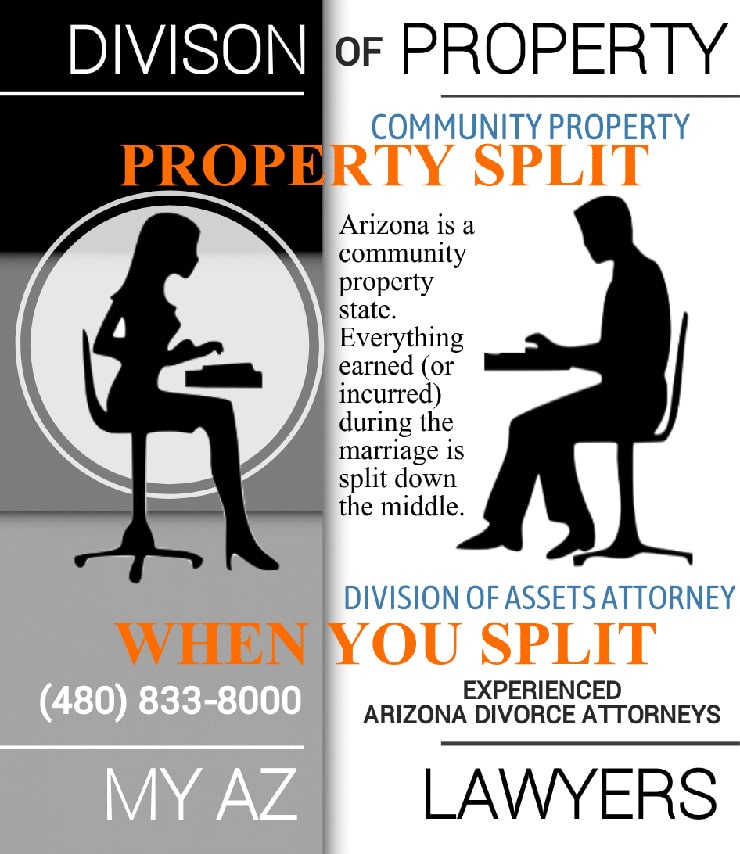ARIZONA COMMUNITY PROPERTY AND PROPERTY DIVISION FAQs
With My AZ Lawyers
Arizona is one of nine community property states, meaning that everything earned (or incurred) during the marriage is split down the middle.
ANSWER:
When an asset is community property, it will require proof of extenuating circumstances for it to be split in any way other than 50/50.
ANSWER:
Community property will be divided evenly between the spouses. Anything earned before the marriage (or after a divorce), along with inheritance, is considered separate property that will remain with the spouse it belongs to in a separation.
ANSWER:
Yes, the terms “community property state” and “50/50 state” can be used interchangeably. Be wary that separate property can become commingled if your spouse contributes to maintenance or improvements to an asset during the marriage.
ANSWER:
Any property acquired during the marriage, regardless of the state it is located in, will be considered community property. Even if a spouse acquires a property in their name alone during the marriage, it will be considered community property.
ANSWER:
Inheritance is not divided in a divorce, but may require court analysis if the inheritance was commingled with other assets. Gifts from family may also be considered separate property in a divorce. You will need to be able to prove in court that such gifts were your separate property.
ANSWER:
No, an inheritance is separate property and will remain the property of the heir after the marriage. If the heir uses the inheritance to contribute to a community property asset, that amount of contribution will be attributed to the heir spouse when it is divided.
ANSWER:
If one spouse is forced out of the home during divorce proceedings, the spouse may be credited for the extra expenses they incurred during that period in the property division. However, a spouse can only be legally “forced” out of the home if they were abusive towards the other spouse who then obtained a restraining order/order of protection against them. Another rare exception is if the house and everything in it was entirely separate property. You should speak with an attorney before leaving your marital home during a divorce, or forcing your spouse to leave the home.
ANSWER:
Bills, including repairs to the home where one spouse is residing alone, will be split between the couple 50/50 until the divorce is finalized and the assets are separate.
ANSWER:
Your best option is likely to sell the home and split the proceeds. Affording the home will only be more difficult during and after a divorce. The proceeds will be divided based on how much of the equity in the home is community property.
ANSWER:
Retirement plans require a special court order to be divided during a divorce called a Qualified Domestic Relations Order, or QDRO. The portion of the pension earned before the marriage will be considered separate property. The portion earned during the marriage will be divided by the QDRO.
ANSWER:
A personal injury award, including those for pain and suffering, will be separate property. The award will not be divided between the couple in the divorce.
ANSWER:
Arizona is a no-fault divorce state. Unless a spouse committed marital waste, like gambling excessively or buying a mistress expensive gifts before the divorce, one spouse will not receive more of the community property because of their conduct during the marriage. However, if one parent never watched the kids during the marriage, this can affect custody, and consequently child support, proceedings.
ANSWER:
If the company wishes to sell the business instead of continuing to work together, the court will have a professional evaluator determine how much the business is worth. One spouse may be ordered to buy out the spouse from their share of the business. Otherwise, the couple can continue to operate the business but split income down the middle.
ANSWER:
Unless you paid the house off in full before the marriage, the house will be community property. Any equity incurred during the marriage will be split between the divorcing couple, and both have the right to live in the home during the divorce proceedings.
ANSWER:
An appraiser will determine the value of all of your significant assets. A preliminary injunction automatically goes into effect once a divorce is filed which will prevent the sale of these assets. You can only sell properly like your home if you have absolutely no other funds available for necessary expenses such as fees for your divorce attorney. You should speak with an attorney before proceeding with a home sale. Some family law firms offer free consultations if you are unable to come up with any funds for attorney’s fees up front.
ANSWER:
Yes, a creditor can collect from either debt, even the spouse that wasn’t ordered to pay the debt in the divorce. That spouse would then take the spouse originally ordered to pay the debt to court. The court may transfer the debtor’s spouse to the paying spouse to compensate them. If the debtor spouse has filed bankruptcy, the paying spouse may not be able to recover.








